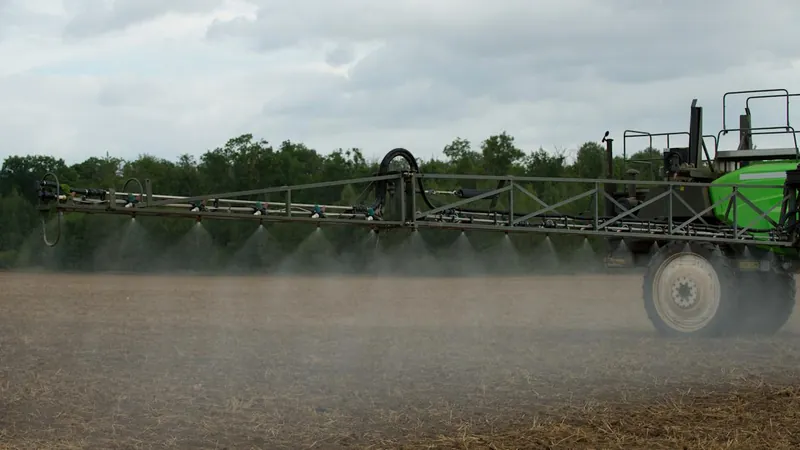
Shocking Truth Revealed: The Ecological Catastrophe Linked to Our Everyday Pesticides
2025-04-08
Author: Daniel
For years, the negative effects of pesticides on living organisms and ecosystems have been well-documented. However, groundbreaking new research has revealed a staggering truth: pesticides are not just harmful to targeted pests, but they devastate nearly all forms of life.
In a landmark study published in the journal Nature Communications, a collaborative team of scientists from the United Kingdom and China performed one of the most extensive analyses on pesticide impacts to date. Co-author Ben Woodcock stated, "Our study provides an unparalleled insight into the consequences of pesticide use on the natural environment globally."
By reviewing over 1,700 studies on various types of pesticide applications—agricultural, commercial, and domestic—the researchers uncovered a remarkable and alarming reality. The negative effects of pesticide use were described as "overwhelming" and "wide-ranging," affecting hundreds of species across the globe.
The detrimental impacts varied widely, influencing reproductive health, growth rates, foraging and hunting capabilities, metabolism, mating behaviors, and much more. Sadly, the research indicated that pesticide exposure frequently results in premature deaths and significant population declines among affected species.
"It is often assumed that pesticides are toxic primarily to the target pest and closely related organisms, but this is clearly not true," warned researcher Dave Goulson. "Concerningly, we found pervasive negative impacts across plants, animals, fungi, and microbes, ultimately threatening the integrity of entire ecosystems."
The Stark Reality of Biodiversity Loss
The detrimental role of pesticides in biodiversity loss is not merely an abstract concern; it has serious implications for humanity as well. The Center for Biodiversity and Conservation, part of the American Museum of Natural History, emphasizes that biodiversity is essential for providing resources that humans rely on, such as food, shelter, and medicine.
Ecosystems also offer critical services—pollination, climate regulation, water purification, and nutrient cycling—that are vital to support agriculture and maintain the balance of nature. Yet, the reliance on chemical pesticides continues, even as their ecological costs become glaringly apparent.
"Pesticides are a necessary evil," Woodcock explained. "Without them, global food production and farmers' livelihoods could dramatically collapse. However, our findings stress the urgent need for policies that encourage reducing pesticide dependence."
Path to a Sustainable Future
Efforts are now underway to mitigate the adverse effects of pesticides. While some chemical applications will remain, researchers advocate for minimizing usage whenever possible. For example, more than 10% of farmland in the European Union is now managed without synthetic pesticides, showcasing a move toward more sustainable agricultural practices.
A surprisingly simple yet effective alternative to chemical sprays is encouraging the growth of wildflowers. These support natural predators like ladybugs and beetles, which can help control pest populations without the use of harmful chemicals. In addition, wildlife-friendly landscaping can enhance habitats for natural pest control agents such as frogs, birds, and hedgehogs.
Looking to the future, Woodcock hinted at the potential for technological advancements, including artificial intelligence monitoring systems that can intelligently track pest populations, thus allowing for more precise and responsible pesticide applications.
As we become more aware of the ecological consequences of our actions, the need for sustainable agricultural solutions has never been clearer. It's time to rethink our reliance on pesticides and strive for a healthier planet for all living beings.
 Brasil (PT)
Brasil (PT)
 Canada (EN)
Canada (EN)
 Chile (ES)
Chile (ES)
 Česko (CS)
Česko (CS)
 대한민국 (KO)
대한민국 (KO)
 España (ES)
España (ES)
 France (FR)
France (FR)
 Hong Kong (EN)
Hong Kong (EN)
 Italia (IT)
Italia (IT)
 日本 (JA)
日本 (JA)
 Magyarország (HU)
Magyarország (HU)
 Norge (NO)
Norge (NO)
 Polska (PL)
Polska (PL)
 Schweiz (DE)
Schweiz (DE)
 Singapore (EN)
Singapore (EN)
 Sverige (SV)
Sverige (SV)
 Suomi (FI)
Suomi (FI)
 Türkiye (TR)
Türkiye (TR)
 الإمارات العربية المتحدة (AR)
الإمارات العربية المتحدة (AR)